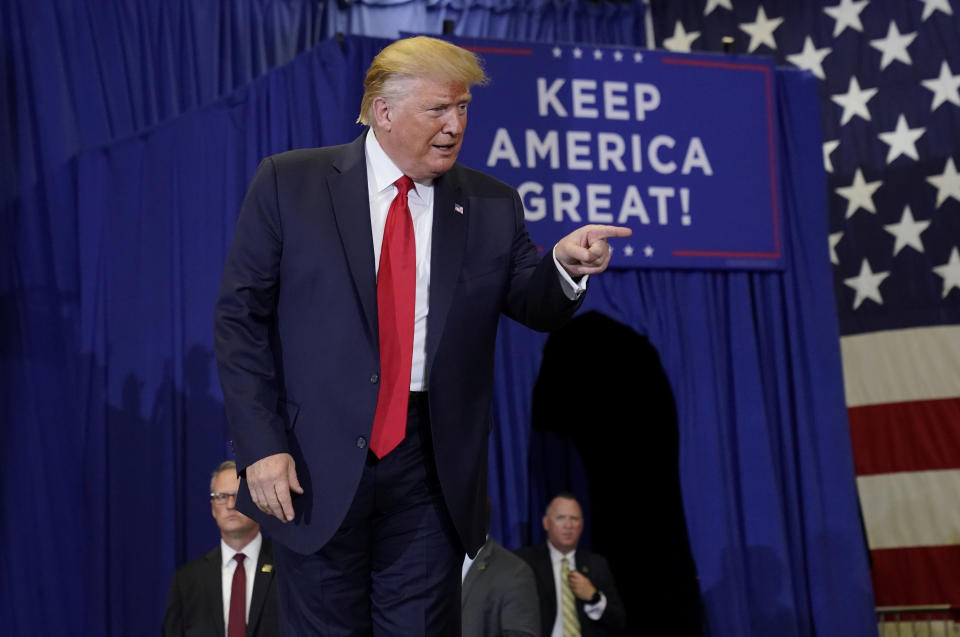Trump’s trade war has killed 300,000 jobs
President Trump says he is “winning big time, against China.” But his trade war is causing measurable damage to the U.S. economy, with the pain likely to worsen.
Forecasting firm Moody’s Analytics estimates that Trump’s trade war with China has already reduced U.S. employment by 300,000 jobs, compared with likely employment levels absent the trade war. That’s a combination of jobs eliminated by firms struggling with tariffs and other elements of the trade war, and jobs that would have been created but haven’t because of reduced economic activity.
The firm’s chief economist, Mark Zandi, told Yahoo Finance that the job toll from the trade war will hit about 450,000 by the end of the year, if there’s no change in policy. By the end of 2020, the trade war will have killed 900,000 jobs, on its current course. The hardest-hit sectors are manufacturing, warehousing, distribution and retail.
Other data back up the Moody’s Analytics numbers. Employers have created 1.3 million jobs so far this year, down from 1.9 million during the same period in 2018. The manufacturing sector has actually contracted, with many producers struggling with higher prices caused by Trump’s tariffs. Business investment is growing by the smallest amount since late 2016.
Beginning last year, Trump has hiked tariffs on about half of all imports from China. The average tariff on Chinese imports has risen from 3.1% before Trump got tariff-happy, to 21.2% now, according to Chad Bown of the Petersen Institute for International Economics. Those are taxes paid by American importers, who do their best to pass the added cost on to their own customers. Sometimes they can’t, and have to absorb the tariffs as a higher cost that lowers profits. And sometimes they can force their Chinese vendors to lower prices, to help offset the higher cost of the tariffs.
On Sept. 1, Trump imposed a 15% tariff for the first time on finished consumer goods imported from China, including clothing, shoes, appliances and food. A similar tariff is due to go into effect Dec. 15 on a deeper set of consumer goods, including electronics and smartphones. At that point, the average tariff would have risen to 24.3% and Trump would have hiked taxes on virtually everything imported from China.
An ‘escalation’ scenario
China has done the same to American exports, and simply refused to buy some American products, such as agricultural goods. Negotiators will restart trade talks soon, but many analysts are skeptical of a deal between two egocentric presidents insistent on saving face. “We remain skeptical that [Chinese President] Xi will be willing to accept any deal, even one that is limited in scope, with Trump going forward,” Beacon Policy Advisors told clients recently.

Trump is in denial, if his public comments are any indication. He says repeatedly, and falsely, that China is paying the tariffs, rather than Americans. He says the economy is doing great even though it’s clearly slowing down. Growth is only around 1.6% at the moment, and it could slow to 1% or worse by the end of the year.
Nobody knows where the trade war is headed. Moody’s Analytics examined an “escalation” scenario with even higher tariffs and other trade hostilities between China and the United States. The Federal Reserve tries to intervene by rapidly cutting interest rates to zero, but there’s still a deep recession in the U.S. and Europe. In a de-escalation scenario, Trump makes a deal with China by the end of 2019 and gradually removes the existing tariffs. The economy stabilizes and stocks rally.
Many investors assume Trump has no choice but to hammer out a trade deal with China, because his reelection depends on it. But many of those same investors thought there’d be a trade deal by now, and never foresaw Trump going as far as taxing consumer imports. The key factor may be whether Trump believes his own fictitious spin, or can actually see the harm his trade war is causing.
Rick Newman is the author of four books, including “Rebounders: How Winners Pivot from Setback to Success.” Follow him on Twitter: @rickjnewman
Confidential tip line: [email protected]. Encrypted communication available. Click here to get Rick’s stories by email.
Read more:
We need more monopolies like Google
How to tell if a Trump recession is coming
Democrats are attacking the wrong companies
Trump’s biggest gamble yet: tax hikes before an election
Obama was better for your 401(k) than Trump has been
Read the latest financial and business news from Yahoo Finance
Follow Yahoo Finance on Twitter, Facebook, Instagram, Flipboard, SmartNews, LinkedIn, YouTube, and reddit.


